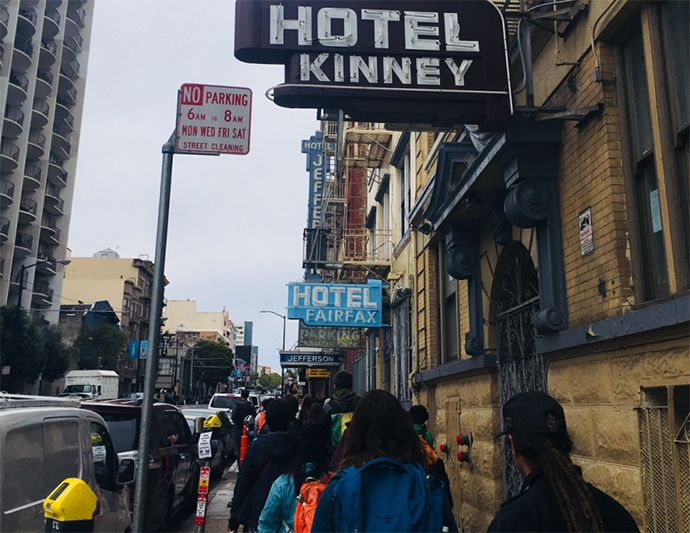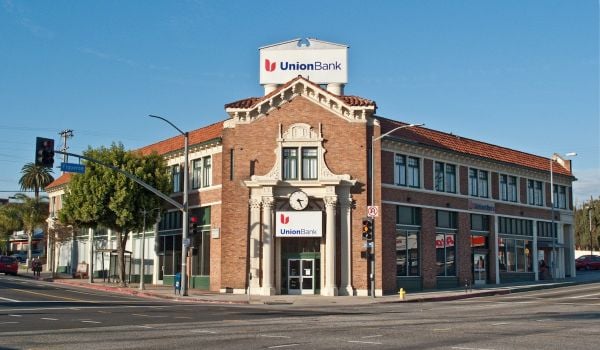Reem Assil is a Syrian and Palestinian chef and owner of Reem’s California Arabic bakery, in Oakland. Starting out as a farmers market stand, the bakery has since gone on to be named a 2018 restaurant of the year by Food & Wine. Assil also recently opened a new eatery, Dyafa. Earlier this year the James Beard Foundation (considered the Oscars of the food world) named her a semifinalist for best chef in the west.
Assil is one of nearly 30 restaurant owners (97 percent of them women) who, starting out each with less than $5,000 in capital, have gone from a kitchen incubator in San Francisco’s Mission District to their own brick and mortar locations across the Bay Area. And now, plans are in motion for that kitchen incubator, La Cocina, to build a shared brick-and-mortar food hall for businesses currently under its incubation, in an area of San Francisco that is home to a particularly high-need population.
At the former site of a long-abandoned post office once noted in the San Francisco Chronicle as the “No. 1 blight in the Tenderloin,” the future La Cocina Municipal Market is envisioned as a 7,000-square-foot food hall featuring new and established entrepreneurs providing healthy, affordable meals to area workers and residents — a majority of whom live in single-room occupancy housing unequipped with kitchens.
In many respects, expanding into the Tenderloin makes sense as a logical next step for La Cocina, founded in 2005 out of the desire to encourage informal food businesses operated mostly by Latina immigrant women to take the leap from working out of their home kitchens into formalized enterprises. While women of color start businesses of all industries at a far higher rate than other demographics, they are also disproportionately more likely to fail because of lack of access to capital or other resources crucial for a start-up’s success.
The Tenderloin District has a long history as a starting off point for newcomers to San Francisco, dating back to the miners of the California Gold Rush in need of short-term housing in its many hotels. Those accommodations eventually became converted into low-cost single-room occupancy units, which became an affordable refuge for some of the city’s most vulnerable, also attracting programs and organizations that serve vulnerable populations — helping to feed a perception of the area as seedy and crime-ridden, despite its proximity to downtown. The neighborhood remains a resilient hub for the city’s immigrant communities.
“I think the Tenderloin is the densest neighborhood, there are more children than anywhere else in the city, it has a 97 employment rate, mostly in the food industry,” says Caleb Zigas, founder and executive director of La Cocina. “There are more immigrants and refugees, who are vibrant and hardworking and (the area) is largely ignored.”
It took two years of negotiating to finally sign a lease with the city of San Francisco to occupy space on the abandoned post office property, which the city plans to have redeveloped with affordable housing on the floors above the new food hall.
As the city raises money to develop affordable housing on the site within the next decade, La Cocina has agreed to build kitchen and dining space to incubate seven low-income women entrepreneurs at a time, potentially employing more than 30 area residents at a time.
In the two years since negotiations with the city began, construction costs have skyrocketed and the price tag to build the food hall has ballooned to $4.2 million. With contributions including from the city, the Shorenstein family (who sold the property to the city) and $1 million of La Cocina’s own cash reserves, the nonprofit still needs to fill a $1.5 million gap in funding to get work started on the build-out.
La Cocina’s intent is to launch debt-free to keep down costs and keep prices affordable for entrepreneurs and their potential customers in the area.
“This is not just for people who are willing to pay a higher price point, but for all in the Tenderloin, for low income, immigrants, refugees and also those who work there,” says Zigas.

Serena Maria Daniels is an award-winning Chicana journalist and founder and editor of Tostada Magazine, a Detroit-based digital food & culture journalism platform that centers stories and perspectives of immigrants and people of color.
Follow Serena .(JavaScript must be enabled to view this email address)
















